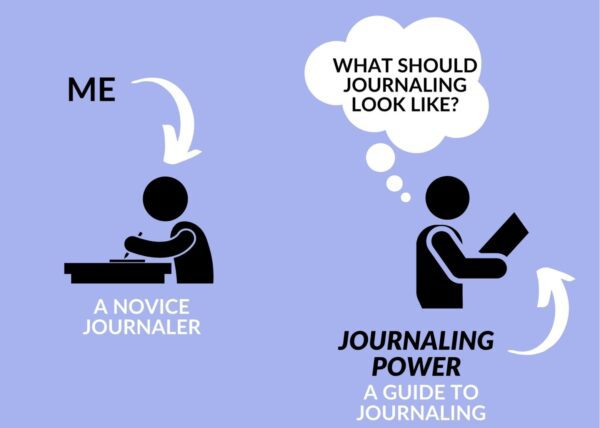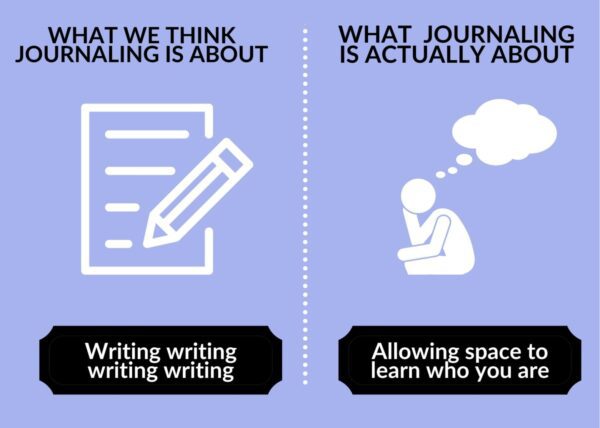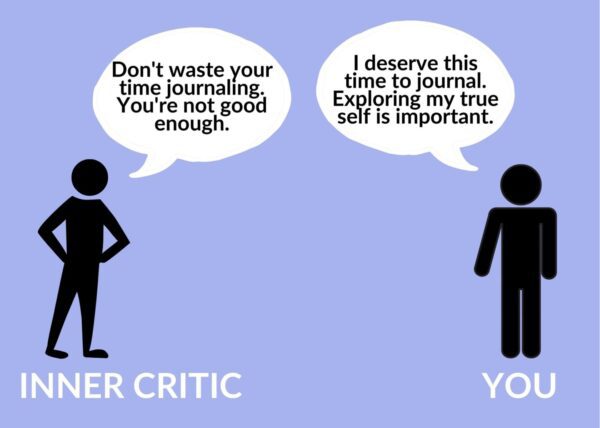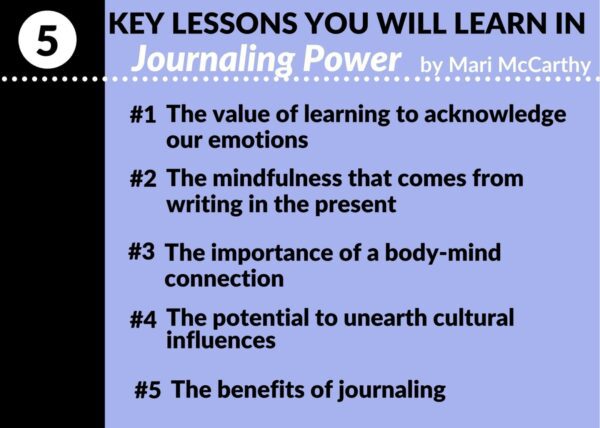Book Review: Journaling Power: How to Create the Happy, Healthy Life You Want to Live..
I’ve written a blog about self-awareness, vulnerability, and related personal development topics for the past two years. While I’ve always been interested in the psychology behind it all, I dove deeper into the research for my blog. I would read articles and pour over scientific studies. Then, I attempted to apply my newfound knowledge to my life – all the while turning my findings into informative posts.
This blogging pursuit brought me into communication with Mari McCarthy, founder of the online journaling community Create Write Now. Eventually, it led me to a copy of Journaling Power: How to Create the Happy, Healthy Life You Want to Live.
I’d included the practice of journaling in many of my posts; journaling, my research said, is beneficial for self-awareness. But, as a novice journaler, I became excited to learn more. I hoped Journaling Power – the first full-length book on journaling I’ve read – would give me more information on applying the practice in my life.
Journaling Power gives practical tools and advice on how to journal effectively. It’s full of strategies and prompts for readers looking to journal more. It also explains how journaling can help heal our inner issues; this purpose is supported by both scientific research and Mari’s personal experiences.
.
Finding Connection and Validation on your Journaling Journey (and how Journaling Power helps)
As I read Journaling Power: How to Create the Happy, Healthy Life You Want to Live, I kept having these “sounds familiar” moments. The author, Mari L. McCarthy, would say something about journaling or mindsets (or really anything), and I would find myself physically nodding as I read.
Yes, yes, yes, something in my mind would say, sometimes excitedly, sometimes knowingly. But every time, in a way that made me feel motivated to keep reading – because Mari validated my experiences by sharing her own. I wasn’t ridiculous or silly or alone in my struggles; instead, others felt the same way. Other people experienced the same challenges and thoughts.
This validation is what inspired me to keep learning and applying a journaling practice in my life. Ultimately, I began to feel validated in the benefits it gave me.
And, my friends, I believe Journaling Power can give you the validation you need for your own journaling journey, too.
.
The Challenges of Starting a Journaling Habit
I’ve always loved creative writing. My childhood bedroom was littered with notebooks and journals; the new, blank pages always represented a world of exciting potential. As I got older, handwritten pages turned into typed documents on my laptop. I’ve written hundreds of thousands of words down in my lifetime thus far.
It wouldn’t be a far reach, then, to assume that an aspiring writer like myself could easily become an avid journaler.
Unfortunately, this wasn’t the case. Time and time again, I would write a few “Dear Diary” entries, only to neglect the journal for over a year. What’s more, my failed attempts at journaling stood out so powerfully in my mind that I almost gave up the possibility of journaling altogether. Sure, I could scribble something down now and then. But journal consistently? Who’s got the time, patience, or motivation to do that, I told myself.
What I didn’t realize is this: journaling isn’t about writing. Not at its most fundamental level, anyway.
.
The Truth on What Journaling Is About
Journaling is about silencing your inner critic, digging deep into your life, and affording yourself the space to learn who you are. Writing is just the conduit to help you do so.
Mari McCarthy helped teach me this lesson. Her book Journaling Power helped solidify the truths that I knew all along but was too afraid, busy, or blocked to see.
And she didn’t do it with the factual description of a scientist or the exaggerated bravo of a self-help coach. If she had, I don’t think I would have heard it.
Instead, she did it with the relatable, vulnerable voice of a person who’s been through it herself.
.
Universal Truths Inspired by Journaling Power
Mari McCarthy was born in the 1940s in the great city of Pittsburg. I was born in the 1990s in a small town in upstate New York. Mari went to a Catholic School, studied business, and worked for big-shot companies across the country. I went to a public school, studied humanities, and work for a small school as an English teacher. Mari was diagnosed with M.S., and I’m a healthy and active 27-year-old.
Yet, I related to almost everything she said in Journaling Power.
Now, I’ve spoken to Mari on multiple occasions, and I will admit that we’re similar in many ways. We’re both goal-oriented, hard-working, and curious about ourselves and the world. But I don’t think these similarities are why I related so much to her stories in Journaling Power.
No, I think I related to the stories because they speak to the universal truths we all go through. Mari isn’t afraid to talk about the challenges we face or the inner critical voice that we all have telling us, You’re not good enough.
When Mari explained her learned tendency to hide her emotions, I thought of the countless times I’ve bitten my lip to prevent any tears. As she detailed her struggles to go from “either/or” thinking to “also, and” thinking, my mind flipped to the one-sided standards I create in my life.
And, as she described the critical voice that told her journaling isn’t a worthy use of time, I felt my own critical voice telling me the same thing. It almost felt like Mari had read my mind. But then I realized that she merely stated what we all deal with every day, but we’re too afraid or unaware to admit.
.
Talking Back to Your Inner Critic
The best part of Journaling Power, though, didn’t reside in these shared experiences. They came when Mari validated my own misgivings and doubts, and then provided tools to push them back.
Mari instructs us to talk back to our Inner Critic. (And, throughout the book, she encourages us to have two-sided conversations in our journal – a concept I loved and have applied readily since). She even gives us the dialogue, “This is my own special time, and I deserve it. Later on, I will do some useful things for other people. Right now, I am exploring my true self, and this is important for me.”
Even after reading this quote, my Inner Critic snuck up as I journaled the very prompt next prompt. This is a waste of time, it told me. You should be doing something more productive. You’ve spent too much time on this already.
And I promptly talked back to it, armed with the dialogue Mari gave me.
Journaling Power talks about other doubts and criticisms our Inner Critics throw at us. All of which I’ve experienced, and I’m sure you have to. Villains that try to hold us back in life and in our attempts to build a journaling habit in the first place.
Mari helped me to give a name to these villains. And, once I named them, how to defend myself against them. I didn’t need fancy armor, self-help purchases, or elaborate schemes. I merely needed a pen, a notebook, and a belief in the power that both contained when in my hand.
.
Journaling Power Trips and Strategies
Journaling Power doesn’t offer instantaneous transformation, and that’s why I liked it so much. Mari is realistic in her guidance and practical in her approach. She offers various strategies and “Journaling Power Trips” throughout the books. Each chapter ends with a list of prompts that immediately give you a way to apply your newfound knowledge and exploration.
I spent a week and a half going through the book and prompts. Each day, I would read a chapter and tackle the corresponding prompts. Sometimes, it would take me a few days to get through the chapter’s questions. I tried not to “rush to get them done,” as I typically would’ve done. Instead, I fought back my Inner Critic and reminded myself that the journey would be worth it. Journaling would be worth it.
As I reflect on the self-insight I gained from Journaling Power, I don’t doubt that it was entirely worth it. But I still think the book gave me something far more powerful than this initial self-awareness. It gave me validation: I was not alone in my challenges, but I could overcome them.
I believe Journaling Power can do the same for you.
.
5 Key Lessons In Journaling Power
Journaling Power gives you a comprehensive look at journaling and what it can do for you. Some of the topics that Mari discovered include:
-
The value of learning to acknowledge our emotions
In 2010, Brené Brown’s TedTalk “The Power of Vulnerability” became a Youtube sensation. Since then, the concept of vulnerability has begun to dig roots into popular culture. People are beginning to talk more and more about the importance of being vulnerable.
I’m a big Brené Brown fan, and I quickly jumped on the “vulnerability is important” bandwagon. Half of my blog posts talk about how to be vulnerable and why we should never shy away from vulnerability, even if it’s hard.
However, jumping on the bandwagon and living a vulnerable life are two different things. Emotions are confusing, challenging, and often out of our control. What’s more, many of us have been taught to shove down our emotions.
If Brené Brown read Journaling Power, I imagine she would approve of Mari’s story. Long before Brené Brown became popular, Mari made the transformative realization that she needed to express her emotions rather than hide them. Once a blasphemous concept for her, “feel” became her new favorite word. Since this epiphany, she shows us how much richer her life has been.
Mari didn’t make this realization on her own; her journal helped show her the way.
.
-
The mindfulness that comes from writing in the present
Mindfulness has become a bit of a buzzword in the last few years, and for a good reason. The benefits of mindfulness – especially in our attention-distracting society – are critical in a happy, healthy life. Journaling is often cited as a key practice in developing mindfulness.
A life event forced Mari to become more mindful. After living a fast-paced life, filled with work, success, and action, a health diagnosis forced her to slow down and reflect on her life. She became aware of how much of her mental capacity filled with work, leaving little time for recovery.
Ultimately, journaling introduced her to being in the present moment. Eventually, this mindfulness spilled over into other areas of her life. She began to live more intentionally.
This shift from “attention-filled” to mindfulness didn’t happen overnight (nor does Mari instruct that it will for us, either). But it did happen through the practice of journaling and the “forced” focus that it gives us.
.
-
The importance of a body-mind connection
Growing up when “mental health” rarely was discussed, Mari happened upon discovering a “body-mind connection” through her life circumstances. A diagnosis of M.S. forced her to think about her body more mindfully.
Initially, the purpose of this “body inventory” was to check in with negative symptoms. As time went on and Mari’s physical journaling hand got stronger, her “body checks” took on a life of its own. In Journaling Power, Mari writes about how she began to see her mind and body as connected entities. This came after years of seeing her body as a separate vehicle to her mind.
Today, the concept of a mind-body connection is sprinkled throughout self-help and mindfulness practices. However, many of us are still at a loss for how to connect the two, especially people like me, who tend to get stuck in the mind.
Mari’s diagnosis with M.S. is unique, but her experience with journaling to help tap into greater bodily awareness is not. Journaling Power gives strategies for how journaling can help us achieve a connection we’ve long overlooked.
.
-
The potential to unearth cultural influences
Journaling isn’t just about our own minds and bodies. Mari takes us down the pathway of this concept through her life experience; in doing this, she made it feel accessible for me to follow.
Cultural influences have a significant impact on our thinking, yet most of us have no awareness of this influence. After all, cultural messages and social norms inundate us from a young age. By the time we stop to question it, our perspective is already shaped.
Mari explains that society often tells us what not to do because “we are conscious whenever we break away from the cultural norm and do something unique and creative.” She takes us through her journey of realizing that the messages she grew up with – whether from her parents, her school teachers, or the media – didn’t have to be her own. This reckoning with letting go of previous conceptions isn’t easy. Nevertheless, it’s key to healing the “issues in your tissues” and becoming the best version of yourself.
How can we unearth the cultural influences that seem to be the foundation of our very existence? By stepping back, gaining perspective, and asking ourselves better questions.
In other words, we can do so through the power of journaling.
.
-
The benefits of journaling
It should be evident from this list how much Mari shows us what can be gained through journaling. However, lists cannot always contain the true potential of a habit, and this is no different. Journaling Power goes even deeper into the numerous benefits of journaling.
Mari walks us through the transformation that journaling can offer, as well as the healing it can provide. In Journaling Power, Mari takes you on a journey and shows you these proven benefits through her life, not solely through research. In doing so, she instills in the reader the confidence to do the same.
.
.Conclusion: Journaling Power
As I think about writing more for my blog, I think about how I can be more like Mari. How I can live more than research, look inward instead of outward, and show through experience what “how-to” lists can never do.
Reading Journaling Power and embarking on my own journaling journey feels like a pretty great first step.








Wow Kara,
Thank you for your review. So glad Journaling Power worked for you! Here’s a Journaling Power Self-Care Workbook for you and your community. http://bit.ly/3rwvkYP